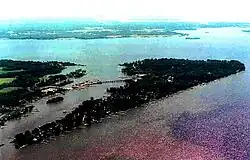Cobb Island (Maryland)
Cobb Island is a small island located at the confluence of the Potomac and Wicomico rivers in southern Charles County, Maryland, United States.[3] It is located approximately 45 miles (72 km) south of Washington, and is considered to be within the Washington, D.C. MSA. Cobb Island is separated from the mainland by Neale Sound and connected to it by a 0.11-mile-long (180 m)[4] fixed bridge carrying Maryland Route 254.
Cobb Island, Maryland | |
|---|---|
 Location of Cobb Island, Charles County, Maryland | |
| Coordinates: 38°15′30″N 76°50′38″W | |
| Country | United States |
| State | Maryland |
| County | Charles |
| Area | |
| • Total | 0.93 sq mi (2.39 km2) |
| • Land | 0.63 sq mi (1.62 km2) |
| • Water | 0.30 sq mi (0.77 km2) |
| Elevation | 10 ft (3 m) |
| Population (2020) | |
| • Total | 929 |
| • Density | 1,484.03/sq mi (573.16/km2) |
| Time zone | UTC-5 (Eastern (EST)) |
| • Summer (DST) | UTC-4 (EDT) |
| ZIP code | 20625 |
| GNIS feature ID | 1988529[2] |
Cobb Island is an unincorporated community and census-designated place (CDP). As of the 2010 census, the CDP had a population of 1,166.[5] The community has a small post office, a volunteer fire department and rescue squad,[6] a Baptist church, a large community green space (Fisherman's Field) and a small playground for children. Commercially, there are two seafood restaurants with marinas, a marina with a pizzeria restaurant chain, a small bar and grill, a seasonal coffee shop, art gallery and bakery, and a small market.

History
Name origin and privateer past
The Island was owned in 1642 by James Neal, a privateer (a legal pirate working for the British Empire) who captured Spanish ships bearing treasure to Spain from Central America. Captured Spanish coins were cut into "cobbs" (smaller coins) and distributed to Maryland colonists, which led to the name "Cobb Island".[7]
World's first human voice radio transmission
On December 23, 1900, Reginald Aubrey Fessenden sent and received the first intelligible speech by electromagnetic waves on a pair of masts 50 feet (15 m) high and 1 mile (1.6 km) apart on Cobb Island.[8] Fessenden was using a spark transmitter with a Kintner-Brashear interrupter.[9]
20th century and later
Robert Crain bought Cobb Island and organized the Cobb Island Development Company. In 1922 and 1923, the company constructed roads, a summer resort and a bridge to the island.[10]
References
- "2020 U.S. Gazetteer Files". United States Census Bureau. Retrieved April 26, 2022.
- "US Board on Geographic Names". United States Geological Survey. 2007-10-25. Retrieved 2008-01-31.
- U.S. Geological Survey Geographic Names Information System: Cobb Island (Maryland)
- "Highway Location Reference: Charles County" (PDF). Maryland State Highway Administration. 2010. Retrieved 2011-10-03.
- "Profile of General Population and Housing Characteristics: 2010 Demographic Profile Data (DP-1): Cobb Island CDP, Maryland". United States Census Bureau. Retrieved August 3, 2012.
- "Cobb Island Volunteer Fire Department & EMS - Charles County, Company 6". Retrieved 3 October 2011.
- Patrice Gaines, Washington Post (August 20, 1994) Cobb Island:The Water Offers An Everyday Escape
- Belrose, John S. (September 1994). "Fessenden and the Early History of Radio Science". The Radioscientist. 5 (3). Retrieved 3 October 2011.
- On the Birth of Wireless Telephony, John S. Belrose
- Cronin, William B. (2005). The Disappearing Islands of the Chesapeake. p. 150. Retrieved 2022-12-03.
- "Census of Population and Housing". Census.gov. Retrieved June 4, 2016.
External links
 Cobb Island travel guide from Wikivoyage
Cobb Island travel guide from Wikivoyage- Cobb Island Official FACEBOOK page
- Census information about Cobb Island, MD 20625
- Gaines, Patrice (August 20, 1994). "Cobb Island: The Water Offers An Everyday Escape". The Washington Post. Retrieved 2008-10-17.
